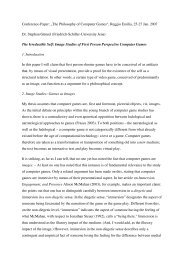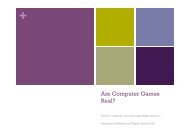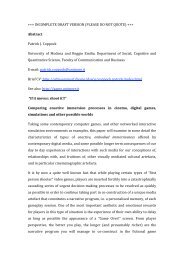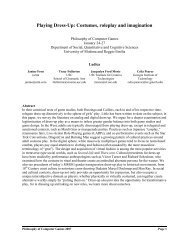Patrick John CoppockSemiotics <strong>and</strong> <strong>the</strong> body: C.S. <strong>Peirce</strong> on <strong>the</strong> <strong>Mind</strong>-<strong>Body</strong>-<strong>World</strong>relation1. <strong>Peirce</strong>, personality <strong>and</strong> <strong>the</strong> tongueThe American philosopher <strong>and</strong> logician <strong>Charles</strong> <strong>S<strong>and</strong>ers</strong> <strong>Peirce</strong>, generally consideredone of <strong>the</strong> founding fa<strong>the</strong>rs of <strong>the</strong> philosophy of pragmatism <strong>and</strong> of contemporarysemiotics, once wrote in his indomitable, almost tongue-in-cheek, philosophical style:“It is true, for instance, that men are selfish, that is, that <strong>the</strong>y are really deluded into supposing<strong>the</strong>mselves to have some isolated existence; <strong>and</strong> in so far, <strong>the</strong>y have it. To deny <strong>the</strong> reality ofpersonality is not anti-spiritualistic; it is only anti-nominalistic. It is true that <strong>the</strong>re are certainphenomena, really quite slight <strong>and</strong> insignificant, but exaggerated, because <strong>the</strong>y are connectedwith <strong>the</strong> tongue, which may be described as personality. The agility of <strong>the</strong> tongue is shown inits insisting that <strong>the</strong> world depends upon it. The phenomena of personality consist mainly inability to hold <strong>the</strong> tongue. This is what <strong>the</strong> tongue brags so about.” [CP 8.82]Later in <strong>the</strong> same piece he goes on to quip that:“Meantime, physicians are highly privileged in that <strong>the</strong>y can ask to see people's tongues; forthis is inspecting <strong>the</strong> very organ of personality.” [CP 8.85]So what may <strong>Peirce</strong> have been trying to get at here? Well, one possible reading of <strong>the</strong>first of <strong>the</strong> two citations above could be as follows: Man is a essentially social being,born into a community of o<strong>the</strong>rs, <strong>and</strong> though he may (selfishly <strong>and</strong> deludedly in<strong>Peirce</strong>’s view) believe himself to have “some isolated existence” from <strong>the</strong>se o<strong>the</strong>rs, henone<strong>the</strong>less is irremediably destined to remain a part of a wider interpretativecommunity. However, as long as he continues to believe that he does exist in somekind of isolation from <strong>the</strong> o<strong>the</strong>rs, his communicative behaviour, metaphorically (<strong>and</strong>physically) represented by <strong>the</strong> enunciation (or not) of linguistic signs by his tongue,makes it appear so, at least in a limited sense, to both himself <strong>and</strong> o<strong>the</strong>rs who mayhave been fooled by <strong>the</strong> “agility” of his tongue in its “insisting that <strong>the</strong> world dependsupon it.” This agility of <strong>the</strong> tongue gives rise to certain phenomena, which although“really quite slight <strong>and</strong> insignificant, but exaggerated”, work toge<strong>the</strong>r with <strong>the</strong> abilityof <strong>the</strong> enunciator to exercise at least some degree of self-control over this agility,contributing in doing so to <strong>the</strong> creation of something we may come to conceive of asan autonomous “personality”.<strong>Peirce</strong> scholars generally read <strong>the</strong> two ra<strong>the</strong>r well known text segments above as partof a series of light-hearted pokes by <strong>Peirce</strong> at his perennial straw-man nemesis ofnominalism, <strong>the</strong> philosophical doctrine which claims (amongst o<strong>the</strong>r things) thatabstract scientific laws - “generals”, as <strong>Peirce</strong> often referred to <strong>the</strong>m - <strong>and</strong> <strong>the</strong>methods of inquiry by which <strong>the</strong>se laws are derived, cannot be claimed to have anymore existential reality than <strong>the</strong> actual words (or terms) used to denominate <strong>and</strong> speakof <strong>the</strong>m. <strong>Peirce</strong>’s argumentational strategy in <strong>the</strong> texts above is <strong>the</strong>n, to try <strong>and</strong>undermine a thought perspective attributed to a model nominalist author-enunciatorby ridiculing anyone (or anything) who would try to force-feed us <strong>the</strong> erroneous ideathat <strong>the</strong> world/ reality - <strong>Peirce</strong> often spoke of “<strong>the</strong> Real” in this context - exists for us
merely as a result of those words we have made up <strong>and</strong> elected to utter (or not) inorder to speak <strong>and</strong>/or write about it.Framed in this way, we can perhaps more easily underst<strong>and</strong> <strong>Peirce</strong>’s seemingly ra<strong>the</strong>rcryptic claim at <strong>the</strong> beginning of <strong>the</strong> first text cited above that “To deny <strong>the</strong> reality ofpersonality is not anti-spiritualistic; it is only anti-nominalistic.”Within a consistently argued “nominalist” perspective - alive <strong>and</strong> kicking today inmore relativistic forms of “post-modern” thought, <strong>and</strong> certain areas of philosophy oflanguage <strong>and</strong> cognitive science - we find asserted, <strong>and</strong> attempted justified <strong>the</strong> opinionthat scientific concepts, <strong>and</strong> <strong>the</strong> abstract laws that can be expressed in terms of <strong>the</strong>seconcepts, are no more than social constructs, based on opinions couched in aconsensual view of truth.From <strong>Peirce</strong>’s point of view, this way of framing reality seriously neglects <strong>the</strong>complex issue of what kinds of relations may possibly exist between sensible,interpretable phenomena, or signs, as <strong>Peirce</strong> terms <strong>the</strong>m, which we actually, or mighton some future occasion come to encounter as elements of our ongoing personalphenomenal experience. Adopting a nominalistic ontological stance in relation to <strong>the</strong>problem of underst<strong>and</strong>ing reality implies, in <strong>Peirce</strong>’s view, a grove oversimplificationof <strong>the</strong> fundamental relational complexity of phenomenological experience, <strong>and</strong>accordingly too, of <strong>the</strong> continuous relationship 1 he believes exists between mind,body <strong>and</strong> world. A nominalistic approach presupposes, insists <strong>Peirce</strong>, an ontologicalframework which does not allow us to benefit from <strong>the</strong> important lessons we mightlearn if we take our embodied sensible experience seriously, study it systematicallyusing a scientifically valid experimental method, <strong>and</strong> considering <strong>the</strong> results of <strong>the</strong>seexperiments in relation to <strong>the</strong> broad train of naturally, historically <strong>and</strong> sociallymediated semiotic processes that precede <strong>and</strong> frame current experience, as well aspossible future experience, <strong>and</strong> <strong>the</strong> new sign relation complexes, or “would be’s”,involved in this experience.Science, says <strong>Peirce</strong>, builds on what has already been discovered, <strong>and</strong> on fur<strong>the</strong>rprocesses of systematic inquiry <strong>and</strong> experimentation. An essential component of anywell functioning experimental process is being genuinely surprised in our experienceof <strong>the</strong> world. As he puts it:“The majority of discoveries […] have been <strong>the</strong> result of experimentation. Now, no manmakes an experiment without being more or less inclined to think that an interesting resultwill ensue; for experiments are much too costly of psychical <strong>and</strong> physical energy to beundertaken at r<strong>and</strong>om <strong>and</strong> aimlessly. And naturally, nothing can be possibly learned from anexperiment that turns out exactly as was anticipated. It is by surprises that experience teachesall she deigns to teach us.” [MSS 305, 306] 21 <strong>Peirce</strong> ties <strong>the</strong> notion of continuity of relation to his concept of Synechism, which he in turn sees as related to hisconcept of agapastic evolution, whereby “advance takes place by virtue of a positive sympathy among <strong>the</strong> createdspringing from <strong>the</strong> continuity of mind” [CP 6.303], quoted by Kelly A. Parker in his book The Continuity of<strong>Peirce</strong>’s Thought (1998: 16). The following quote from <strong>Peirce</strong> is also relevant in this context : “Almost everybodywill now agree that <strong>the</strong> ultimate good lies in <strong>the</strong> evolutionary process in some way. If so, it is not in individualreactions in <strong>the</strong>ir segregation, but in something general or continuous. Synechism is founded on <strong>the</strong> notion that <strong>the</strong>coalescence, <strong>the</strong> becoming continuous, <strong>the</strong> becoming governed by laws, <strong>the</strong> becoming instinct with general ideas,are but phases of one <strong>and</strong> <strong>the</strong> same process of <strong>the</strong> growth of concrete reasonableness.” [CP 5.4], quoted in Parker1998: 16. See also Coppock 1997c.2 This passage is from a draft version (Part B: On Phenomenology (Draft 2) ) of a lecture given by <strong>Peirce</strong> atHarvard University on <strong>the</strong> second of April 1903. The lecture was one of a series of six on <strong>the</strong> advertised topic ofPragmatism as a Principle <strong>and</strong> a Right Method of Thinking. See Turrisi 1997: 37-57 (Commentary) <strong>and</strong> 159-160(cited text) for fur<strong>the</strong>r details.
- Page 1: Università degli Studi di Modena e
- Page 5 and 6: “The question is what the phenome
- Page 7 and 8: somewhat equivalent to the seven or
- Page 9 and 10: and in doing so, dampen the effects
- Page 11 and 12: tumbleweeds will not generally be a
- Page 13 and 14: organised, evaluated, elaborated an
- Page 15 and 16: 4. Mind in nature and nature in min
- Page 17 and 18: development of modern IA (Intellige
- Page 19 and 20: norms regarding communication, acti
- Page 21 and 22: dissipative systems, chaotic change
- Page 23 and 24: ThirdnessIOSecondnessMindWorld/ Rea
- Page 25 and 26: ReferencesAamodt, Anders & Komorows
- Page 27 and 28: Feibleman, James K.1946 An Introduc
- Page 29 and 30: Rodda, M. & Grove, C.1987 Language,






